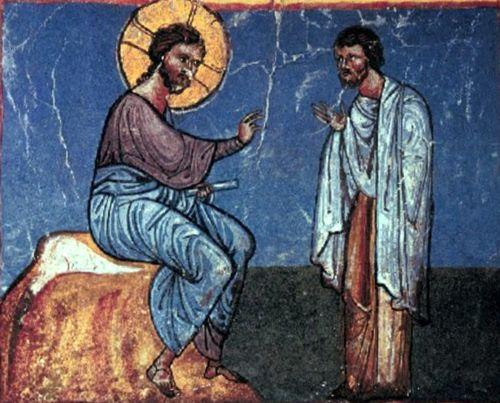Luke 7:11-17 (7:13) – July 30, 2017

“Compassion for a Widow”
I do not often make generalizations, but I suspect everyone will agree with this one. Pretty much everyone knows the grief, pain and anguish of having a close relative or loved one die. I’ve dealt with anxiety and fear, grief, anger and mourning plenty in the hospital when I worked as a chaplain, and afterwards, as pastor of this church.
This Gospel reading features a funeral procession, mourning and grieving, on the way to bury a dead loved one. This Gospel reading also features the widow of Nain (the town). One of the Gospel of Luke’s guest stars in a cameo appearance, the widow is in deep grief.
Naturally in dismay and trauma, I suspect all the widow wants is to be able to see her son again, alive.
But, I am getting ahead of myself. Let’s concentrate on Jesus.
Hear, again, today’s reading from the Gospel of Luke, plus some commentary. “Jesus went to a town called Nain, and his disciples and a large crowd came with Him.” The Rabbi Jesus and close friends are traveling around Israel. (Remember, Jesus was an itinerant Rabbi, like a circuit-riding teacher and preacher.) The Rabbi Jesus did not live in one, stationary place, and His followers took on the same, nomadic lifestyle.
“As Jesus came to the gate of the town, a man who had died was being carried out.”
I would like everyone to put your imagining cap on. You might be familiar with what I mentioned several weeks ago, introduced by St. Ignatius. Among other matters, Ignatius was a spiritual director. He wanted all people to get closer to God. What is more, there are things we can see, touch and feel about this reading—in our minds. This vivid use of imagination is one amazing way for that experience to happen.
So, Jesus was on the way, traveling all up and down the country. Right in the middle of things, as usual. What should Jesus and His friends run into but a funeral procession?
Imagine the traffic jam, right at the gates of the city of Nain. All the hustle and bustle of people coming and going. Animals, wagons and carts, shopkeepers, drivers making deliveries, people in close quarters, shuffling, passing through the city gates. Perhaps it’s a dry, dusty day. Add the dust, dirt and grit to the scene.
Can you see the people gawking at the funeral procession? One thing about this funeral procession: it’s for a younger person. We don’t know how much younger he was, but I know today that when a young person dies, they have lots of people at the funeral service. Can you hear the crying and wailing of the people who are mourning. Perhaps they are also squeezing through the busy city gate with everyone else. Luke says, “A large crowd came alongside his mother; she was a widow, and he was her only son.”
Her only son. Can you hear the sorrow and anguish packed into that small statement? Can you see the shock at the death of a young person, the loss of years not lived, of length of life not experienced?
When, suddenly, the Rabbi Jesus approaches the procession. He not only views that procession from among the many people grieving that day, but Jesus also goes beyond. He enters into the procession itself. Jesus interrupts, in a very large way. Listen to Luke’s words: “When Jesus saw her, he had compassion for her. He told her, “Do not weep.”
I would like to remind people about a quick word study I did a few weeks ago. I wanted to see what a proper, in-depth study on the word “compassion” had to say. According to one word study, “Com-passio literally means to “suffer with.” In Latin, com means “with” and passio means “to suffer.” [1]
As we consider what St. Ignatius wants us to do with our imagination as we think more deeply about this Scripture passage, we can add to it the intense emotions of grief, sorrow, longing, worry, anger, and suffering. On top of all of these deep, intense emotions, we can now add compassion. That’s not only compassion on a human level, but Jesus’s compassion. Godly compassion and caring. Wow! Can you say, “Wow!” with me?
In our children’s message today, I spoke about our scripture reading. I said Jesus recognized that a woman he met was extremely sad. This widow was left all alone, with no relatives at all! And, Jesus had empathy for her. the word “empathy” means to recognize another person’s emotion and then feel what that person feels; if someone feels sad, we recognize she feels sad and we feel sad with her, for example.
What the Gospel writer Luke does not say (because everyone in his time would understand it very well), is “Luke’s inclusion of the detail that this was her only son highlights her difficult situation. Without a husband and now without any son to support her, it is very likely that the widow is now or will soon be financially destitute.” [2]
Do you see now why it is such a big deal that Jesus felt for this widow? He showed empathy for her and her extreme distress. Emotional, psychological and financial distress, as well as the spiritual upset, grief and trauma.
Jesus not only feels empathy and compassion for this widow, He goes that important step further. Continuing with Luke chapter 7: “Jesus told her, “Do not weep.” Then He came forward and touched the coffin. The people carrying it stopped moving. And Jesus said, “Young man, listen: get up!” The dead man sat up and began to speak, and Jesus gave him to his mother.
Our Lord Jesus does a miracle! Not only a healing, but raising the dead.
Jesus not only felt empathy, He did a miracle. He gave this woman back her much beloved son, and He stabilized her financial position, too. Jesus did a significant healing on several different levels.
That miracle is wonderful. In bible times, that is. I can just hear people stating that we couldn’t do anything even remotely resembling that marvelous miracle. Not today. Not us little, insignificant folks. That’s for big, important people, like Jesus, or the Apostles.
Our Lord Jesus is so awesome, and a wonder-worker, too. He showed empathy, yes, and also the incredibly personal touch: he cared deeply for that widow. It is so important to know Jesus first felt compassion and empathy for the widow before He healed her son.
Empathy is an important way for us to begin caring for others, which we learn through Jesus in this week’s example of compassion. It’s easiest for us to show empathy and compassion to people who are a lot like us, and harder to show this toward people who are very different from us. Who is different from you, and how can you be loving and caring to them?
This presents an opportunity to all of us. Find someone who is different from you and reach out to them, today. Be kind and compassionate.
How can you—we—practice empathy and caring, today? We can become more aware of how we can be loving, kind and helpful to those around us, like Jesus was with the mother in our Scripture passage today. A loving challenge from our Lord Jesus, today. Go, and do likewise.
Amen.
[1] Compassion in the New Testament (Part 1) http://www.jmarklawson.com/traveling-in-place/2012/03/compassion-in-the-new-testament-part-1.html
[2] http://www.workingpreacher.org/preaching.aspx?commentary_id=1679 Commentary, Luke 7:11-17, Jeannine K. Brown, Preaching This Week, WorkingPreacher.org, 2013



